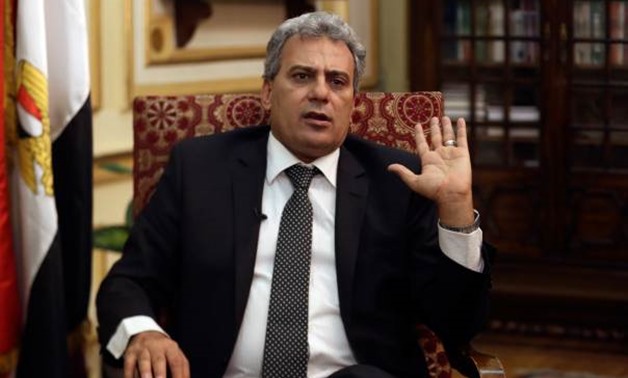
President of Cairo University Gaber Nassar during an interview with the live talk show “Akher Al-Nahar” on private satellite channel Al-Nahar.
CAIRO – 8 January 2019: Gaber Nassar had served as president of Cairo University for the arguably severest four years in Egypt in the 21st century. Nassar was known for his decisive opinions, and powerful decisions that were rarely cancelled after they were implemented.
Nassar's term started early August 2013, just few days before the dispersal of Rabaa al-Adaweya and Nahda squares sit-ins supporting Muslim Brotherhood and former regime headed by Mohamed Morsi, a Muslim Brotherhood high-level official. Nassar ended his term in July, 2017, following the fourth anniversary of Morsi's ousting.
In an interview with Egypt Today, Nassar said that the extremist groups including Muslim Brotherhood and the Salafists are based on the principle of hearing and blind obedience.
He said that the extremist religious discourse will remain present despite the efforts to get rid of it, adding that extremist groups' ideology have been based on some books including Ibn Taymiyah's, a controversial medieval Sunni Muslim theologian, jurisconsult, and reformer.
Nassar said that the religious discourse was moderate in the 1940s, 50s, 60s and early 70s, as Muslims were taught about worship and Islam's teaching, but since the mid-1970s, religious discourse has begun to deviate to jihad and murder.
Nassar said that the religion unfortunately have been turned to a profession, adding that one of the young preachers receives up to 50 thousand dollars per lecture. He added that some people turned religion to a trade, as they would offer only the content that people would like just to get money.
Censuring renowned Salafi scholar Abu Ishaq Al-Heweny, Nassar accused the Sheikh of holding double standards. Nassar said that despite Heweny's earlier attack on the niqab when the niqab threatened his own interests, he said that a woman wearing niqab cannot teach Quran as she would not be able to show students points of articulation. However, after Nassar's decision to ban niqab in Cairo University, Heweny attacked Nassar for the former's personal interest.
When the niqabi women threatened their financial gains, Heweny attacked the niqab, while when we took a decision promotes enlightenment and encircles his point of view, he attacked us, Nassar explained.
In our interview Nassar called for banning niqab in all public places nationwide, considering it a political theme in the first place.
He said that he fought extremism at Cairo University with popular arts and cultural seminars, in response to the Sheikhs who deny arts and prohibit everything, adding that they destroy human-beings rather than building them.
Addressing Yasser Borhami, vice president of the Salafist Call, Nassar said that Borhami adopted radical trends that have poisoned people's religion, adding that these trends cannot suit the country currently.
Asked about President Abdel Fatah al-Sisi, who always calls on national Islamic entities headed by Al-Azhar to work on renewing religious discourse and remove misunderstandings, amid Egypt's war against extremism and terrorism, Nassar said that Sisi's reform battle is characterized by boldness.
Additional reporting by Amr Mohamed Kandil


Comments
Leave a Comment